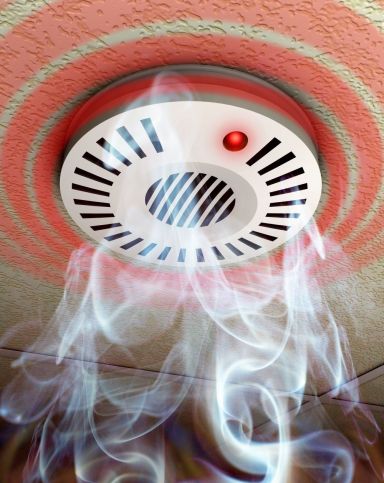Short of building a fortress surrounded by a piranha- filled moat, there are certain steps that everyone can take in order to make your home as safe as possible for yourselves and –more importantly  –for your children. If you have just moved into a new home, or even if you’ve been there a while, you can use this checklist of home safety precautions to take a little tour around the place and determine where you could improve your defenses. This is a great checklist for parents to share with their young adult offspring who are leaving home for the first time and moving into their own home, be it a dorm room, a flat or apartment with room -mates, or a home of their own. And no, this isn’t really a Doomsday Preppers Checklist;it is instead a reminder of the kinds of home maintenance issues that can cause accidents, and a few simple burglary deterrents.
–for your children. If you have just moved into a new home, or even if you’ve been there a while, you can use this checklist of home safety precautions to take a little tour around the place and determine where you could improve your defenses. This is a great checklist for parents to share with their young adult offspring who are leaving home for the first time and moving into their own home, be it a dorm room, a flat or apartment with room -mates, or a home of their own. And no, this isn’t really a Doomsday Preppers Checklist;it is instead a reminder of the kinds of home maintenance issues that can cause accidents, and a few simple burglary deterrents.
Safeguard Against Fire
One of the most dangerous and damaging events that can occur in your home is a fire. And one of the most important safety tools that you can utilize for your own protection is a smoke detector. A smoke detector in proper working condition can save your life. If you are moving into a new home, looking for smoke detectors needs to be on the top of your safety list. Make sure there are enough smoke detectors to protect all areas of the home, including the following spaces:
- Kitchen
- Dining room
- Living room
- Hallway
- Bedrooms
- Staircase landing
- Garage
And remember, a smoke detector is of no use unless it is equipped with fresh, working batteries. It is a good idea to replace your smoke detector batteries twice every year in coordination with Daylight Savings Time. Whenever you set your clock either back or forward, you also know it’s time to change your smoke detector batteries.
Of course, it is preferable to take precautions to try and prevent a fire before it ever starts. Here are a few basic home fire prevention tips:
- Check for loose electrical outlets and frayed electrical cords, and avoid overloading the circuits.
- Unplug any electronics not currently in use, especially those that create heat (iron, toaster etc…)
- Carefully follow manufacturer’s instructions for lighting gas appliances, or call a professional.
- Keep matches and lighters out of reach of children.
- Never smoke in bed. In fact, why are you smoking anyway?
Safeguard Against Falls
Nearly half of all the injuries that occur in the home are caused by falls, most of which could have been prevented with certain basic preventative steps. You can help prevent a lot of potential slips, trips and falls by checking for the following possible accidents waiting to happen:
- Stairs- Install safety gates in homes with small children. Examine the railing for stability, and check for loose stair treads, or loose floor coverings.
- Bath tubs and shower stalls- Wet surfaces are hazardous, so take a moment to put down self-adhesive slip-guards or a slip resistant bath matt.
- Doorways- Often a spot for uneven floors, doorways can cause a trip hazard if there are loose transition strips.
- Windows- An open window can create a danger for a child, so don’t rely on window screens to prevent a fall. Keep furniture and cribs away from windows.
Safeguard Against Burglary
Tips for burglary prevention are some of the most important safety precautions you can take in order to protect your home and your belongings from theft, and quite possibly to protect your family from dangerous intruders. You can install the most recommended alarm system that you can afford to buy, and that is a huge safety measure. But there are also basic steps you can take to deter miscreants from ever attempting to gain access to your home. Here are a few basic tips for burglary prevention:
- Change the locks on all exterior doors immediately upon moving into a new home, including garage doors. Use as many deadbolts as you need to feel safe. Make sure all exterior door hinges are on the inside.
- Trim shrubbery and trees so they can’t create a screen or a hiding place for someone trying to climb unnoticed into a window.
- Check to be sure window locks are all in working order, and install security pins when possible.
- Make sure that there is adequate exterior lighting. Check that the entry lights work, and for extra safety, install motion sensitive exterior lights.
Unforeseeable accidents will still happen sometimes, but whenever you have an opportunity to exercise safety precautions you should take whatever steps are necessary to improve conditions that will safeguard your home and protect your family.











